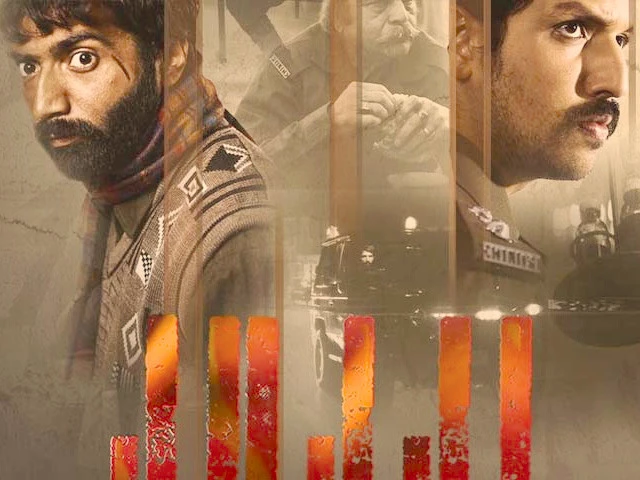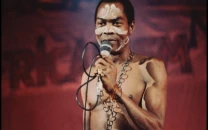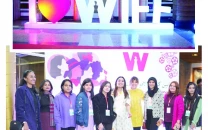'Jujji' puts Pindi on global cinema map
Variety report hails Habib Shahzad's neo-noir as a bold new voice in Pakistani filmmaking

When 'Variety' reported last week that Buffalo 8 had picked up worldwide rights to the Pakistani crime thriller 'Jujji', the news sent a ripple through both the country's film circles and international indie cinema networks.
The acquisition marked not just the global debut of an ambitious Habib Shahzad-directed and Ahmad Umar Ayaz-written neo-noir, but a rare moment when a story born in Rawalpindi's streets found a global stage.
Jujji' is a gritty psychological thriller about two detectives on the trail of a serial killer in Rawalpindi. Muhammad Arsalan plays the murderer, while Mustafa Rizvi and Anjum Habibi star as the officers - SI Naveed and Constable Arshad - whose investigation turns into a haunting examination of morality and obsession.
Produced by BHM Films in collaboration with Y?gen Studios and Lollipop, the film's production spanned two years and was shot entirely on location in Rawalpindi.
The trailer, unveiled alongside Buffalo 8's announcement, captures a city cloaked in flickering lights, sweat, and dread - a visual tone that earned 'Jujji' comparisons to global noir cinema in Variety's feature.
Buffalo 8's head of distribution, Nikki Stier Justice, called the film a "bold, genre-defying thriller" that merges "authentic South Asian storytelling with the universal appeal of true-crime cinema."
Based in Santa Monica, Buffalo 8 manages production, post-production, and distribution for independent films, and its latest acquisition places 'Jujji' in the company of several festival-winning international titles.
The film launches on demand on November 21 in the US and UK via Amazon and Verizon Fios/Vubiquity, with additional territories to follow. The deal represents a significant milestone for Pakistani independent cinema, which has increasingly turned to digital platforms to reach global audiences.
"'Jujji' is not just a film - it's a statement that Pakistani cinema can take risks and still resonate globally," said Shahzad. "We wanted to capture the soul of Rawalpindi while making it universally human. It's a deeply personal journey that became a collective one for our team - and we hope, for audiences everywhere."
The project began as a self-funded effort to spotlight Rawalpindi's overlooked narratives and quickly developed a reputation for its raw realism. It went on to win Best Film at the Gandhara Independent Film Festival 2024, Best Feature at the Punjab Police Film Festival 2024, and was also screened at the Divvy Film Festival.
At each event, 'Jujji' was praised for breaking new ground in Pakistani storytelling. Critics highlighted the film's sharp writing, atmospheric cinematography, and unflinching portrayal of human conflict. The line between justice and vengeance blurs as the detectives descend into the city's darkness, mirroring their own moral decay.
Beyond its narrative tension, 'Jujji' has been celebrated for its portrayal of Rawalpindi itself - not as a backdrop, but as a breathing entity, defined by its contradictions. The film captures the city's narrow alleys, restless energy, and quiet menace in ways rarely seen on screen.
"The idea was to make Rawalpindi a character," said Ayaz, who wrote the screenplay. "Every wall, every streetlight had to feel alive, like it had secrets of its own. The moral ambiguity of the city mirrored that of the story."
That sense of authenticity also stems from the creative team's local roots. Shahzad grew up in Rawalpindi and spent months scouting real police stations, alleyways, and underpasses before shooting. The production used minimal artificial lighting to retain the natural shadows of the city - a stylistic choice that adds to the film's realism.
For Buffalo 8, 'Jujji' represents the kind of risk-taking cinema it seeks to champion. "It's a film that feels both grounded and global," said Stier Justice. "There's something deeply universal about its moral questions - who decides justice, and at what cost?"
The film's success also signals the growing evolution of Pakistan's independent cinema. After years dominated by romantic dramas and comedies, filmmakers like Shahzad are now turning to darker, more introspective stories - ones that explore urban decay, psychological trauma, and the cost of moral compromise.
Yugen Studios, which co-produced the film, sees Jujji's achievement as a sign of things to come. "Pakistani films can travel across borders when grounded in local realities but crafted with global sensibilities," said Hashim Zafar Wadhen, Yugen's head of research and development. "'Jujji' proves that stories from here can compete anywhere if told with honesty and cinematic discipline."
Critics who previewed the film describe it as both a crime drama and a mirror held up to Pakistan's collective conscience. The dialogue, sparse but pointed, captures the tension between duty and doubt. The score, composed with minimalist precision, accentuates moments of silence as much as violence.
More than anything, 'Jujji' stands as a testament to what Pakistani filmmakers can achieve independently - without the gloss of big studios but with a clear creative vision. The film's global release is not just a distribution deal; it's a validation of a movement.
As the film prepares to stream internationally on November 21, its makers remain grounded. "We made 'Jujji' for our own people first," Shahzad said. "But if the world is ready to listen, that means something powerful - it means our stories have finally found their way out."




















COMMENTS
Comments are moderated and generally will be posted if they are on-topic and not abusive.
For more information, please see our Comments FAQ